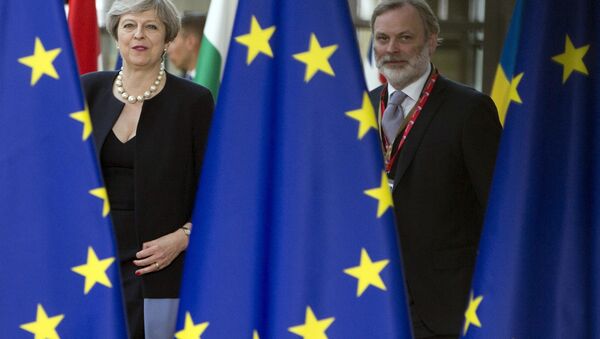Mrs. May said she will produce a 15-page document which will outline her plan, after she was heavily criticized by European Union leaders for the uncertainty around the rights of EU nationals residing in the UK after Britain officially leaves the union.
.@TimFarron responds to Theresa May's proposals to give "settled status" to EU nationals who have lived in UK for 5 years pic.twitter.com/eS79M1z7tj
— Lib Dem Press Office (@LibDemPress) June 22, 2017
EU leaders want reassurance from May and the UK government has agreed that talks on a new trading relationship can't begin until sufficient progress has been made on issues such as citizens' rights. Every passing day of delay is making a final deal more difficult to strike.
Mrs. May's plan will provide details on how she intends to protect the rights of 3.2 million EU nationals residing in Britain once the country leaves the bloc in 2019. She has confirmed she wants to protect the rights of those living legally in the UK, and has referred to the plan as "settled status."
#Brexit negotiations have begun: read our roundup to find out what's at stake ➡ ➡ https://t.co/K52vLS52Am pic.twitter.com/bSxVPSoixj
— European Parliament (@Europarl_EN) 25 June 2017
Hayk Sayadyan, a consultant solicitor from Gulbenkian Andonian Solicitors in London, told Sputnik that prior to Britain's decision to leave the bloc, EU nationals would acquire citizenship under EU law by exercising treaty rights for five years as EU citizens, for either work or as a student. Mrs. May has changed that process slightly.
"Instead of doing it through the normal process of EU law and the framework of EU regulations, it seems the PM wishes to provide a specific policy under which permanent residence — 'settled status' — is granted to EU citizens who are legally living here for a duration of time. So effectively, this is a special domestic measure as opposed to something that directly emanates from the EU law as such. It's nice, but it is a concession being made by the executives within their own powers, rather than anything else," Mr. Sayadyan told Sputnik.
Mr. Sayadyan also told Sputnik that "the new measure seems to be something that comes from the executives themselves and is not a 'creature of the EU law' under the free movement directive (the directive 204/38/EC)."
"The UK government is free to make this provision within domestic law, because the categories under which one can acquire permanent residence or as it's called 'indefinite leave to remain,' which is 'settled status,' are far and wide. And there is residual discretion to grant indefinite leave to remain outside of immigration rules."
Theresa May's proposals plan to guarantee the rights on residency, healthcare, education, employment, benefits and pensions for EU citizens who have been in the UK for five years, and according to Mr. Sayadyan there is a legal reason for this.
"It is supposed to mirror the provisions of EA law, where what is called a ‘qualifying EU citizen' exercising treaty rights does so for a continuous period of 5 years and then acquires permanent residency. So it seems that this provision is there to mirror the basic principles contained in the EU legislation," Mr. Sayadyan told Sputnik.
So is this new government plan viable and can it work?
"Well, in terms of making a provision, it is a provision. And it's better than nothing. It's not ideal, but certainly the prior propositions that were heard, where it was suggested that — come 2019, everything comes to a grinding halt — was unworkable," Mr. Sayadyan concluded.


